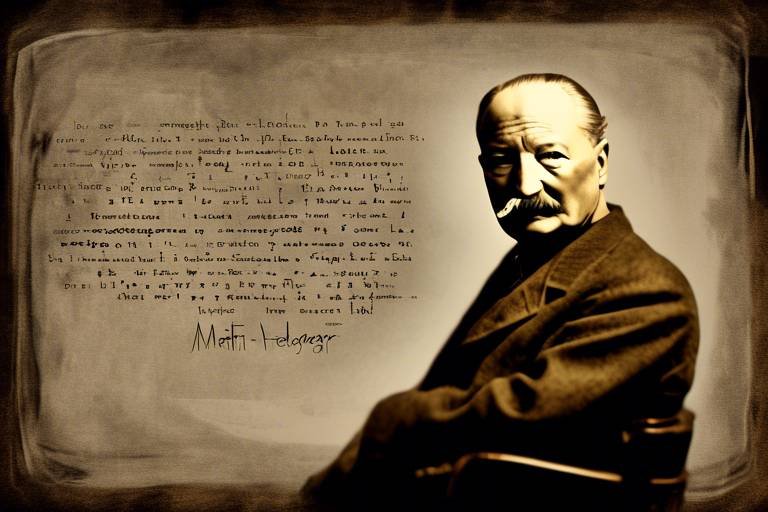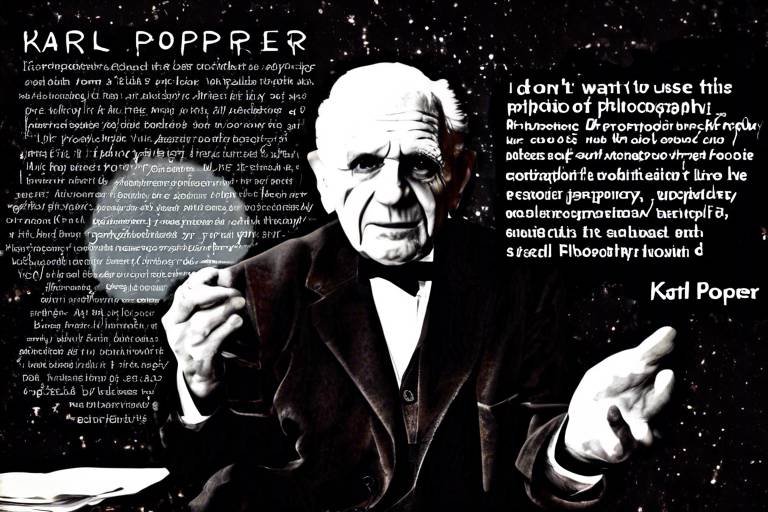Unmasking Philosopher Martin Heidegger’s Existentialism
When we think about existence, it's easy to get lost in the hustle and bustle of daily life, right? Well, Martin Heidegger, a German philosopher, invites us to pause and reflect on the very essence of what it means to be. His work dives deep into the intricacies of human existence, challenging us to peel back the layers of our everyday experiences and explore the profound implications of our being. In a world that often feels chaotic and disconnected, Heidegger's existentialism serves as a compass, guiding us toward a more authentic understanding of ourselves and our place in the universe.
At the heart of Heidegger's philosophy is the notion of ‘Being’. He doesn't just accept the traditional definitions we've inherited; instead, he urges us to question them. What does it truly mean to exist? Are we merely products of our environment, or do we have the agency to shape our own destinies? Heidegger pushes us to embark on a journey of self-exploration, one that is fraught with uncertainty but rich with potential for discovery. His ideas resonate deeply in today's fast-paced society, where many of us grapple with feelings of alienation and a longing for deeper connections.
One of the key concepts in Heidegger's thought is Dasein, which translates to ‘being-there’. This term encapsulates the unique human experience of existence. Unlike other beings, humans possess the ability to reflect on their own being and the world around them. This reflective capacity is what sets us apart and allows us to engage with our existence in a meaningful way. Imagine being at a crossroads in life, where every choice you make is a reflection of your understanding of yourself and your place in the world. This is the essence of Dasein—being aware of one’s existence and the choices that come with it.
Heidegger emphasizes that we are always ‘being-in-the-world’, meaning that our existence is inherently intertwined with our surroundings. Our experiences are shaped by the contexts we find ourselves in, whether it's our relationships, our environment, or the cultural narratives we subscribe to. This interconnectedness highlights that we are not isolated entities; rather, we are part of a larger tapestry of existence. Just as a tree cannot thrive without its roots in the soil, we too cannot fully understand ourselves without recognizing the influences of our environment.
But here's the kicker: Heidegger introduces the concepts of authenticity and inauthenticity. Authenticity is about embracing our true selves, making choices that resonate with our inner values, and living life on our own terms. In contrast, inauthenticity represents a life lived in conformity, where we avoid the hard questions and settle for a superficial existence. This dichotomy challenges us to reflect on our own lives. Are we living authentically, or are we merely going through the motions?
Another fascinating aspect of Heidegger's philosophy is his exploration of time. He argues that our understanding of existence is deeply rooted in our relationship with time. We are not static beings; rather, our identities are shaped by the interplay of our past, present, and future. Think of it this way: every moment we live is a thread in the fabric of our existence, influencing who we are and who we aspire to become. By acknowledging the significance of time, we can better appreciate the journey of our lives and the choices we make along the way.
However, with this profound understanding of existence comes a weighty realization: the concept of existential anxiety. This anxiety arises when we confront the uncertainties of life and the inherent absurdity of existence. It’s that nagging feeling that prompts us to question our purpose and seek meaning. Heidegger suggests that this anxiety can be a catalyst for growth, pushing us to strive for authenticity and a deeper understanding of ourselves.
As we navigate the complexities of modern life, Heidegger's critique of technology becomes increasingly relevant. He warns that our reliance on modern technology can lead to a disconnection from our authentic selves. Instead of engaging with the world in a meaningful way, we risk becoming mere resources, reduced to our utility. This notion of technological enframing encapsulates how technology shapes our perceptions and interactions, often obscuring the deeper truths of our existence.
In response to these challenges, Heidegger advocates for a reconnection with nature and a more thoughtful engagement with technology. He encourages us to reclaim our authentic existence by being mindful of how we interact with the world around us. By fostering a deeper appreciation for our surroundings and the experiences they offer, we can navigate the complexities of existence with greater clarity and purpose.
- What is Dasein in Heidegger's philosophy?
Dasein refers to the unique human experience of 'being-there', emphasizing our capacity to reflect on our existence and make meaningful choices.
- How does Heidegger define authenticity?
Authenticity involves embracing one's true self and making choices that resonate with one's values, as opposed to conforming to societal expectations.
- What role does technology play in Heidegger's existentialism?
Heidegger critiques modern technology for potentially leading to a disconnection from authentic being, urging us to engage with it thoughtfully.

Understanding Being
Heidegger's exploration of 'Being' is nothing short of revolutionary. It challenges the traditional notions that have long dominated philosophical discourse. Instead of treating being as a mere concept, Heidegger invites us to delve deeper into the very essence of existence itself. Imagine standing at the edge of a vast ocean, the waves crashing against the shore; this is akin to the depth of inquiry Heidegger urges us to undertake. What does it mean to exist? Is existence merely about physical presence, or is there something more profound at play?
To understand Heidegger's perspective, we must first recognize that 'Being' is not a static entity; it is dynamic and multifaceted. He argues that our relationship with the world is not merely one of observation but one of engagement. We are not just passive observers; we are participants in the unfolding of existence. This participatory nature of being shapes our experiences, thoughts, and interactions with others. Heidegger emphasizes that we must question our assumptions about the world and ourselves to grasp the true nature of being.
Heidegger also introduces the idea that we often find ourselves lost in the distractions of everyday life, which can cloud our understanding of our own existence. In this context, he encourages us to reflect on our experiences and the choices we make. By doing so, we can uncover deeper insights into our existence. This reflection is akin to polishing a mirror; the clearer it becomes, the more we can see our true selves.
Moreover, Heidegger's inquiry into being is deeply intertwined with the concept of time. He posits that our understanding of being is incomplete without considering the temporal dimension. Our past experiences, present actions, and future aspirations are all interconnected, forming a tapestry of existence that is uniquely ours. This view of being as temporal challenges the notion of a fixed identity and instead presents us as beings in flux, constantly evolving through our interactions with the world.
In summary, Heidegger’s exploration of 'Being' is a profound journey that compels us to rethink our existence. It is not merely an abstract philosophical exercise but a call to engage with the world authentically. By embracing this inquiry, we can begin to understand our place in the universe and the significance of our choices. As we navigate through the complexities of existence, let us remember that the quest for understanding 'Being' is not just a philosophical endeavor; it is an essential part of being human.

The Concept of Dasein
At the heart of Martin Heidegger’s philosophy lies the concept of Dasein, a term that translates to "being-there." This idea is not just a fancy label; it encapsulates the essence of human existence and our unique position in the world. Unlike other beings, humans possess the capacity for self-reflection, allowing us to question our existence and the nature of our reality. Dasein emphasizes that we are not isolated entities; rather, we are deeply embedded in the fabric of our surroundings, intertwined with others and our environment. This interconnectedness shapes our experiences, thoughts, and ultimately, our understanding of what it means to exist.
Heidegger argues that Dasein is characterized by its awareness of being. This awareness is what differentiates humans from other beings. We do not merely exist; we are conscious of our existence, and this consciousness brings with it a profound responsibility. We are constantly navigating the world, making choices that reflect our values and beliefs. But here’s the kicker: these choices are not made in a vacuum. They are influenced by our cultural, historical, and social contexts, reminding us that our existence is a tapestry woven from countless threads of experience.
A crucial aspect of Dasein is the notion of being-in-the-world. Heidegger posits that we are always situated within a specific context, which shapes our perceptions and interactions. Imagine walking through a bustling city; the sounds, sights, and smells all contribute to your experience. You are not just a passive observer; you are actively engaging with your environment. This concept highlights the importance of context in shaping our reality, urging us to consider how our surroundings influence our thoughts and actions. It’s a bit like being a fish in water—you may not realize you’re surrounded by it until you step out.
Furthermore, Dasein is inherently linked to the idea of authenticity. Heidegger challenges us to confront our existence and make choices that resonate with our true selves. In a world where societal norms often dictate our paths, embracing authenticity can feel like swimming against the current. But it’s essential for genuine existence. When we live authentically, we acknowledge our unique experiences and take responsibility for our choices. Conversely, inauthenticity leads to a superficial existence, where we conform to external expectations, losing touch with our true selves.
In addition, Dasein is not static; it is dynamic and constantly evolving. Heidegger emphasizes the role of time in shaping our understanding of being. Our past experiences, present circumstances, and future possibilities all intertwine, influencing our identity and existence. This temporal aspect of Dasein means that we are always in a state of becoming. We are not defined solely by our past; rather, we have the power to shape our future through our choices and actions. It’s like being an artist, painting your life’s canvas with each decision you make, blending colors of experiences into a unique masterpiece.
In conclusion, the concept of Dasein is a profound exploration of what it means to be human. It challenges us to delve deeper into our existence, urging us to recognize our interconnectedness with the world and embrace our authentic selves. As we navigate the complexities of life, understanding Dasein can provide us with valuable insights into our place in the universe, encouraging us to live with intention and purpose.
- What does Dasein mean? Dasein translates to "being-there" and refers to the unique way humans exist in the world, characterized by self-awareness and interconnectedness.
- How does Dasein relate to authenticity? Dasein emphasizes the importance of living authentically, making choices that reflect our true selves rather than conforming to societal expectations.
- Why is context important in Dasein? Context shapes our experiences and perceptions, highlighting that we are always situated within a specific environment that influences our understanding of reality.

Being-in-the-World
Heidegger's concept of is a pivotal idea that reshapes our understanding of existence. Rather than viewing humans as isolated beings, Heidegger emphasizes that we are always engaged in a world filled with others, objects, and experiences. This notion challenges the traditional Cartesian idea of separation between the mind and the world. Instead, Heidegger proposes that our very essence is intertwined with our surroundings, creating a dynamic interplay that defines our existence. Think about it: when you step outside, you’re not merely a spectator; you’re part of a vibrant tapestry of life, influenced by and influencing everything around you.
To further grasp this concept, consider the following aspects of Being-in-the-World:
- Contextuality: Our experiences are shaped by the contexts we find ourselves in. Whether it’s the bustling city streets or the tranquility of nature, each environment offers a different lens through which we perceive reality.
- Interconnectedness: Heidegger posits that our relationships with others play a crucial role in defining who we are. This interconnectedness means that our understanding of self is often reflected in our interactions and engagements with the world.
- Engagement: Being-in-the-World is not a passive state; rather, it involves active participation. We are constantly interpreting our surroundings and making choices that reflect our understanding of existence.
Imagine walking through a forest. Each tree, each sound, and even the smell of damp earth contributes to your experience. You are not just observing; you are experiencing the world in a way that shapes your very being. Heidegger argues that this active engagement is essential to understanding our existence. It's about more than just being present; it's about being authentically aware of our connection to the world.
Moreover, the idea of Being-in-the-World has profound implications for how we navigate our lives. In a society increasingly driven by technology and individualism, it’s easy to forget this interconnectedness. We might find ourselves trapped in our digital devices, losing sight of the rich, textured reality around us. Heidegger warns against this disconnection, urging us to recognize that our existence is not just about individual ambition but about our relationship with the world and others.
In conclusion, Being-in-the-World is a fundamental aspect of Heidegger's existential philosophy. It invites us to reconsider our place in the universe, urging us to embrace our interconnectedness and actively engage with our surroundings. By doing so, we can cultivate a more authentic existence, one that honors the intricate web of life that we are a part of.
- What is the significance of Being-in-the-World in Heidegger's philosophy?
Being-in-the-World emphasizes the interconnectedness of existence, suggesting that our understanding of self is shaped by our environment and relationships. - How does Heidegger's view differ from traditional philosophy?
Unlike traditional philosophy, which often separates the mind from the world, Heidegger asserts that our existence is inherently tied to our experiences and interactions within the world. - Can Being-in-the-World help in modern life?
Yes! Embracing Being-in-the-World can lead to a more authentic existence by encouraging deeper connections with others and a greater appreciation for our surroundings.

Authenticity vs. Inauthenticity
When we dive into the concepts of authenticity and inauthenticity in Heidegger's philosophy, we are essentially exploring what it means to truly exist versus merely going through the motions of life. Imagine authenticity as a vibrant tapestry, woven from the threads of our genuine experiences, choices, and emotions. In contrast, inauthenticity resembles a dull, gray canvas, where we conform to societal expectations and lose sight of our true selves. It’s like choosing to wear a mask every day instead of embracing our unique faces. So, what does it really mean to be authentic?
Heidegger argues that authenticity involves a profound understanding and acceptance of one’s own existence. This means recognizing our freedom to make choices and taking responsibility for those choices. It’s about being true to oneself, even when the world pressures us to fit into predefined molds. On the flip side, inauthenticity is often characterized by a passive acceptance of societal norms and values, leading to a life that feels hollow and unfulfilled. It’s akin to being a puppet on strings, dancing to the tune of others without ever stepping back to ask, “What do I really want?”
To better illustrate this concept, let’s break down some key differences between authenticity and inauthenticity:
| Authenticity | Inauthenticity |
|---|---|
| Embracing one’s true self | Conforming to societal expectations |
| Making conscious, responsible choices | Living passively, without reflection |
| Experiencing genuine emotions | Suppressing feelings to fit in |
| Seeking personal meaning and purpose | Accepting imposed meanings from others |
In a world that often glorifies superficiality, striving for authenticity can feel like a radical act. It requires courage to peel back the layers of societal conditioning and embrace our true selves. However, the rewards are profound. When we live authentically, we cultivate a deeper connection with ourselves and others, leading to a more meaningful existence. It’s about finding that sweet spot where our values align with our actions, creating a life that resonates with our inner truth.
Conversely, inauthenticity can lead to existential angst, a sense of emptiness that arises when we realize we are not living our own lives. Heidegger suggests that this state of inauthenticity can be particularly dangerous, as it distances us from our true potential and the richness of human experience. It’s like being trapped in a maze, where every turn feels familiar yet unfulfilling. Breaking free from this maze requires a conscious effort to reflect on our choices and motivations.
Ultimately, the journey towards authenticity is not a destination but a continuous process of self-discovery and growth. It involves questioning our beliefs, challenging societal norms, and being brave enough to express our true selves, even when it feels uncomfortable. So, the next time you find yourself conforming to expectations, take a moment to ask: “Is this truly me?” Embrace the journey of authenticity, for it is where the essence of being lies.
- What is authenticity according to Heidegger? Authenticity is the state of being true to oneself, making conscious choices, and embracing one’s unique existence.
- How does inauthenticity affect our lives? Inauthenticity leads to a passive existence, where individuals conform to societal norms, resulting in feelings of emptiness and disconnection.
- Why is striving for authenticity important? Striving for authenticity fosters genuine connections with ourselves and others, leading to a more meaningful and fulfilling life.

The Role of Time
When we dive into Martin Heidegger's philosophy, one of the most intriguing aspects is his emphasis on temporality. Time isn't just a linear progression of past, present, and future; for Heidegger, it's a fundamental component of our existence. Imagine time as a river that flows through our lives, shaping our identities and experiences. Each moment we live is like a ripple in that river, influencing not just who we are today, but who we will become tomorrow.
Heidegger argues that our understanding of ourselves is inextricably linked to our perception of time. He introduces the concept of thrownness, which refers to the idea that we are "thrown" into a world already in motion. This means that we inherit a past filled with history and experiences that shape our present. Thus, our identity is not just a product of our choices, but also a reflection of the temporal context we find ourselves in. Think of it like a tapestry, where each thread represents a moment in time, weaving together to create the intricate design of our lives.
Moreover, Heidegger highlights the importance of anticipation—the ability to project ourselves into the future. This forward-looking aspect of time allows us to set goals, dream, and ultimately, shape our destinies. However, it also brings with it the weight of existential anxiety. The more we contemplate our future, the more we become aware of the uncertainties that lie ahead. This anxiety can either paralyze us or motivate us to seek authenticity in our lives. It poses the question: how do we navigate the delicate balance between our past experiences and the future we yearn for?
In essence, Heidegger's exploration of time encourages us to reflect on our existence in a profound way. He invites us to consider how our past informs our present and how our present actions ripple into the future. By understanding the role of time, we can begin to embrace our authentic selves, making choices that resonate with who we truly are, rather than merely conforming to societal expectations. It's a call to live intentionally, to be aware of the moments we inhabit, and to recognize that every tick of the clock is an opportunity for genuine existence.
- What is Heidegger's view on time? Heidegger sees time as a crucial element of our existence, where understanding our past, present, and future shapes our identity.
- How does temporality affect our authenticity? By recognizing the influence of time, we can make choices that reflect our true selves rather than conforming to external pressures.
- What is thrownness in Heidegger's philosophy? Thrownness refers to the idea that we are placed in a world with a history, which influences our understanding of ourselves and our choices.
- How can we cope with existential anxiety related to time? Acknowledging our anxieties can lead to a deeper understanding of our existence, pushing us to seek authenticity and meaning in our lives.

Existential Anxiety
Existential anxiety, a concept deeply rooted in the philosophy of Martin Heidegger, arises when individuals confront the inherent uncertainties of their existence. It's that unsettling feeling that creeps in when you pause and ponder the big questions: Why am I here? What is my purpose? This anxiety is not merely a negative emotion; rather, it's a profound realization that can lead to personal growth and a deeper understanding of oneself. Heidegger believed that this anxiety is a fundamental aspect of being human, as it pushes us to seek meaning and authenticity in our lives.
Imagine standing at the edge of a vast ocean, the waves crashing against the shore. The vastness represents the unknowns of life, and the waves symbolize the incessant questions that wash over us. This metaphor captures the essence of existential anxiety—it’s both daunting and liberating. By facing these uncertainties, we are encouraged to delve into our true selves, to explore who we are beyond societal expectations and superficial roles.
Heidegger posits that existential anxiety can lead to a form of awakening. When we confront our fears and uncertainties, we are compelled to make choices that align with our authentic selves. This journey toward authenticity often involves a struggle against the tide of conformity, where societal norms can drown out our inner voice. It’s a call to embrace our individuality and to live a life that resonates with our true essence.
Moreover, existential anxiety serves as a catalyst for self-reflection. It prompts us to ask critical questions about our existence and the choices we make. By engaging with this anxiety, we can uncover layers of understanding about ourselves and our place in the world. Here are a few questions that often arise during this introspective process:
- What do I truly value in life?
- How do my choices reflect my authentic self?
- Am I living my life for myself or for others?
These questions are not just rhetorical; they are invitations to explore the depths of our being. By grappling with existential anxiety, we can move towards a more authentic existence, one that is rich with meaning and purpose. Heidegger encourages us to embrace this anxiety, viewing it not as a burden, but as a necessary part of the human experience that can lead to profound personal transformation.
In conclusion, while existential anxiety may initially feel overwhelming, it ultimately serves as a powerful motivator for self-discovery and authenticity. By facing our fears and uncertainties head-on, we can navigate the complexities of existence and emerge with a clearer understanding of who we are and what we seek in life.
- What is existential anxiety? Existential anxiety is the discomfort or fear that arises when individuals confront the uncertainties and complexities of their existence.
- How does Heidegger view existential anxiety? Heidegger sees existential anxiety as a fundamental aspect of being human that can lead to personal growth and a deeper understanding of oneself.
- Can existential anxiety be beneficial? Yes, by facing existential anxiety, individuals can gain insights into their true selves and make choices that align with their authentic existence.

The Influence of Technology
In our fast-paced, tech-driven world, the influence of technology is undeniable. Martin Heidegger, a profound thinker, had some compelling insights into how technology shapes our existence. He didn’t just see technology as a set of tools; instead, he viewed it as a lens through which we perceive reality. This perspective is crucial, as it invites us to examine not only what technology does but also how it affects our understanding of being itself.
Heidegger warned that modern technology could lead to a disconnection from our authentic selves. When we rely heavily on technological advancements, we risk becoming mere cogs in a vast machine, stripped of our individuality and depth. Imagine being in a beautiful forest, surrounded by nature's splendor. Now, picture yourself glued to your smartphone, missing the vibrant colors and sounds around you. This metaphor captures how technology can distract us from the essence of our existence, pulling us away from genuine experiences.
One of Heidegger's key concepts is 'technological enframing,' which refers to the way technology organizes our perception of the world. He argued that this enframing reduces our understanding of existence to mere efficiency and utility. In other words, we start to view everything, including ourselves, as resources to be optimized. This shift can lead to a profound sense of alienation. To illustrate this, consider the following table that contrasts authentic existence with a technologically enframed existence:
| Aspect | Authentic Existence | Technologically Enframed Existence |
|---|---|---|
| Perception of Self | Complex, unique identity | Resource to be optimized |
| Connection to Nature | Deep, meaningful relationship | Instrumental view, detached |
| Understanding of Time | Fluid, experiential | Linear, measured |
Heidegger believed that in order to reclaim our authentic existence, we must critically engage with technology rather than passively accept it. This means questioning how technology influences our choices and relationships. Are we using technology to enhance our lives, or are we allowing it to dictate our existence? This inquiry is essential for navigating the complexities of modern life.
Moreover, Heidegger urged us to reconnect with nature as a counterbalance to the overwhelming presence of technology. By immersing ourselves in the natural world, we can rediscover the profound connections that define our humanity. It's like stepping away from the cacophony of city life to find solace in a quiet park; this shift can rejuvenate our spirit and bring clarity to our understanding of being.
In conclusion, Heidegger's critique of technology serves as a vital reminder of the importance of maintaining our connection to authenticity. As we navigate an increasingly digital landscape, let's remember to pause, reflect, and engage thoughtfully with the tools we create. After all, technology should serve us, not define us.
- What is Heidegger's view on technology? Heidegger critiques modern technology for its potential to alienate individuals from their authentic selves and reduce existence to mere utility.
- What does 'technological enframing' mean? It refers to the way technology shapes our perception of the world, often leading to a reductionist view of existence.
- How can we reconnect with authenticity in a tech-driven world? By critically engaging with technology and spending time in nature, we can reclaim our authentic existence.

Technological Enframing
In the landscape of modern existence, Martin Heidegger's concept of emerges as a critical lens through which we can examine our relationship with technology. This term encapsulates the idea that technology is not merely a collection of tools or devices; rather, it shapes our perception and interaction with the world around us. Heidegger argues that in our quest for efficiency and control, we often fall into a trap where technology dictates our understanding of reality. It's as if we are living in a tightly woven net, where every thread is a technological advancement that constrains our view of what it means to be truly human.
Heidegger warns that this enframing can lead to a reductionist view of existence, where individuals are seen merely as resources or cogs in a vast machine. This perspective strips away the richness of human experience, reducing our identities to mere data points or productivity metrics. The implications are profound: when we allow technology to dominate our lives, we risk losing touch with the deeper, more existential questions that define our humanity. Are we merely tools of technology, or do we possess the agency to shape our destinies?
To illustrate this further, consider how modern technology has transformed our communication. While it has made connecting with others easier than ever, it has also fostered a sense of disconnection and superficiality. Social media platforms, for instance, can create a façade of interaction while simultaneously isolating us from genuine relationships. We find ourselves scrolling through feeds, consuming curated images of others' lives, and forgetting the authenticity of face-to-face conversations. This is a prime example of how enframing can distort our understanding of existence.
Heidegger's insights compel us to reflect on the nature of technology in our lives. Are we using technology to enhance our understanding of the world, or are we allowing it to dictate our perceptions? He advocates for a more thoughtful engagement with technology, one that acknowledges its potential to both enrich and impoverish our experience. By fostering a reconnection with nature and embracing the complexities of being, we can reclaim a sense of authentic existence that transcends the confines of technological enframing.
In essence, technological enframing serves as a reminder of the delicate balance we must maintain. We must navigate the intricate relationship between our human essence and the technological frameworks that surround us. By doing so, we can ensure that we remain active participants in our existence rather than passive observers, continually questioning and redefining what it means to be truly alive in an age dominated by technology.
- What is technological enframing?
Technological enframing is a concept introduced by Heidegger that describes how technology shapes our perception and interaction with the world, often reducing individuals to mere resources. - How does enframing affect human existence?
Enframing can lead to a disconnection from authentic being, as it encourages a reductionist view of existence where individuals are seen as tools or data points. - What can we do to counteract technological enframing?
Heidegger suggests fostering a reconnection with nature and engaging thoughtfully with technology to reclaim a sense of authentic existence.

Responses to Technological Challenges
In a world increasingly dominated by technology, Martin Heidegger's philosophy offers profound insights into how we can navigate the complexities of modern existence. He challenges us to reconsider our relationship with technology, urging a shift from passive consumption to a more thoughtful engagement. This involves recognizing that technology is not merely a tool but a way of revealing the world that can either enhance or obscure our understanding of being. To respond effectively to the challenges posed by technology, Heidegger suggests several approaches that encourage a deeper connection to our authentic selves.
One of the key responses Heidegger advocates is a reconnection with nature. He believes that by immersing ourselves in the natural world, we can cultivate a sense of being that transcends the superficiality of technological existence. Nature serves as a reminder of our roots and the essential qualities of life that technology often distracts us from. Heidegger encourages us to spend time outdoors, engage with our surroundings, and appreciate the beauty and complexity of the natural environment. This reconnection can foster a sense of gratitude and awareness that is often lost in the hustle and bustle of modern life.
Furthermore, Heidegger emphasizes the importance of mindful technology use. Instead of allowing technology to dictate our lives, he urges us to reclaim our agency by using it in ways that align with our values and aspirations. This means being selective about the technologies we adopt and how we integrate them into our daily routines. For example, rather than mindlessly scrolling through social media, we might choose to engage with platforms that promote genuine connections or facilitate meaningful discussions. By cultivating a more intentional approach to technology, we can mitigate its potential to alienate us from our authentic selves.
Additionally, Heidegger suggests that we engage in philosophical reflection about the role of technology in our lives. This involves questioning the underlying assumptions that drive technological advancement and considering the implications of our choices. What values are we prioritizing when we embrace new technologies? Are we sacrificing our humanity for efficiency? By critically examining these questions, we can better understand the impact of technology on our existence and make more informed decisions that align with our quest for authenticity.
To summarize, Heidegger's responses to technological challenges can be encapsulated in the following strategies:
- Reconnect with nature: Spend time outdoors to cultivate a deeper sense of being.
- Mindful technology use: Engage with technology in ways that align with personal values.
- Philosophical reflection: Question the implications of technological choices and their impact on existence.
Incorporating these approaches into our lives can help us navigate the complexities of technology while remaining grounded in our authentic selves. By fostering a harmonious relationship with the tools we use, we can ensure that technology serves to enhance our understanding of being rather than diminish it.
- What is Heidegger's view on technology? Heidegger critiques technology for potentially alienating individuals from their authentic existence, advocating for a more thoughtful engagement with technological tools.
- How can I reconnect with nature? Spend time outdoors, engage in activities like hiking or gardening, and practice mindfulness to appreciate the natural world.
- What does 'mindful technology use' mean? It refers to using technology intentionally, choosing platforms and tools that align with personal values and promote genuine connections.
- Why is philosophical reflection important? It helps individuals question the assumptions behind their technological choices and understand their impact on existence and authenticity.
Frequently Asked Questions
- What is the main focus of Martin Heidegger's existentialism?
Heidegger's existentialism primarily revolves around the concept of 'Being' and the unique human experience of existence. He challenges traditional philosophical views, urging us to delve deeper into what it truly means to exist in the world.
- What does Dasein mean in Heidegger's philosophy?
Dasein, which translates to 'being-there,' is a central idea in Heidegger's thought. It emphasizes the human capacity to reflect on their own existence and the world, highlighting our unique position in understanding life.
- How does Heidegger define authenticity?
Authenticity, according to Heidegger, involves embracing one's true self and making genuine choices. It contrasts sharply with inauthenticity, where individuals conform to societal norms and avoid facing their true existence.
- What role does time play in Heidegger's philosophy?
Heidegger considers temporality as a vital aspect of existence. Our understanding of past, present, and future significantly shapes our identity and essence, influencing how we perceive and engage with the world.
- What is existential anxiety in Heidegger's perspective?
Existential anxiety arises when individuals confront the uncertainties of existence. This anxiety can motivate a search for meaning and authenticity, pushing us to explore deeper truths about ourselves and our lives.
- How does Heidegger critique modern technology?
Heidegger critiques modern technology for its potential to disconnect us from authentic being. He warns that it can reduce individuals to mere resources, stripping away the deeper connections we have with our existence and the world.
- What is 'technological enframing'?
'Technological enframing' is a concept introduced by Heidegger, describing how technology shapes our perceptions and interactions with the world. This framing can obscure our understanding of deeper existential truths and realities.
- How can we respond to the challenges posed by technology?
Heidegger advocates for a reconnection with nature and a more thoughtful engagement with technology. By doing so, we can reclaim our authentic existence and foster a deeper understanding of ourselves and our environment.



















